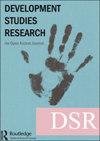设计和使用定量措施的伙伴关系方法:在柬埔寨和尼泊尔共同制定和试行讲卫生男女平等措施
Q2 Social Sciences
引用次数: 4
摘要
摘要:人们已经使用定性方法对讲卫生运动与性别平等之间的联系进行了广泛的探索和记录,但还没有通过定量方法来加强讲卫生运动的规划。水、环境卫生和个人卫生性别平等措施(WASH-GEM)是研究人员和从业者合作开发的一种新的定量多层面工具。本文探讨了WASH-GEM联合制作和实施的三个方面:(i)合作伙伴关系在联合制作过程中的作用,将背景知识和从业者知识纳入衡量发展;(ii)柬埔寨和尼泊尔验证试验的选定结果(n = 3056),其展示了该措施可以通过不同水平和不同共变体的分析来告知讲卫生运动规划的方式;三将研究转化为方案拟订的合作进程。该研究表明,强有力的合作伙伴关系和共同生产过程是制定具有实际意义的概念上严格的定量措施的基础。这篇文章中提出的研究结果对未来旨在影响农村社区性别平等的措施制定和讲卫生运动方案具有启示意义。本文章由计算机程序翻译,如有差异,请以英文原文为准。
A partnership approach to the design and use of a quantitative measure: Co-producing and piloting the WASH gender equality measure in Cambodia and Nepal
ABSTRACT The connections between WASH and gender equality have been extensively explored and documented using qualitative approaches, but not yet through quantitative means in ways that can strengthen WASH programming. The Water, Sanitation and Hygiene Gender Equality Measure (WASH-GEM) is a novel quantitative multidimensional tool co-produced in partnership between researchers and practitioners. This article explores three dimensions of the WASH-GEM co-production and implementation: (i) the role of partnerships in co-production processes for bringing contextual and practitioner knowledge into measure development; (ii) selected results from the validation pilot in Cambodia and Nepal (n = 3,056) that demonstrate ways in which the measure can inform WASH programming through analysis at different levels and with different co-variants; and (iii) the collaborative process of translating research into programming. The study illustrates that strong partnership and co-production processes were foundational for the development of a conceptually rigorous quantitative measure that has practical relevance. The findings presented in this article have implications for future measure development and WASH programming that aims to influence gender equality in rural communities.
求助全文
通过发布文献求助,成功后即可免费获取论文全文。
去求助
来源期刊

Development Studies Research
Social Sciences-Development
CiteScore
3.20
自引率
0.00%
发文量
20
审稿时长
12 weeks
期刊介绍:
Development Studies Research ( DSR) is a Routledge journal dedicated to furthering debates in development studies. The journal provides a valuable platform for academics and practitioners to present their research on development issues to as broad an audience as possible. All DSR papers are published Open Access. This ensures that anyone, anywhere can engage with the valuable work being carried out by the myriad of academics and practitioners engaged in development research. The readership of DSR demonstrates that our goal of reaching as broad an audience as possible is being achieved. Papers are accessed by over 140 countries, some reaching over 9,000 downloads. The importance of the journal to impact is thus critical and the significance of OA to development researchers, exponential. Since its 2014 launch, the journal has examined numerous development issues from across the globe, including indigenous struggles, aid effectiveness, small-scale farming for poverty reduction, sustainable entrepreneurship, agricultural development, climate risk and the ‘resource curse’. Every paper published in DSR is an emblem of scientific rigour, having been reviewed first by members of an esteemed Editorial Board, and then by expert academics in a rigorous review process. Every paper, from the one examining a post-Millennium Development Goals environment by one of its architects (see Vandermortele 2014), to ones using established academic theory to understand development-imposed change (see Heeks and Stanforth 2015), and the more policy-oriented papers that contribute valuable recommendations to policy-makers and practitioners (see DSR Editor’s Choice: Policy), reaches a multidisciplinary audience.
 求助内容:
求助内容: 应助结果提醒方式:
应助结果提醒方式:


